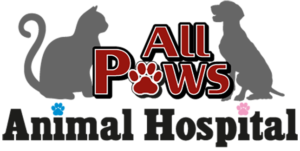Managing Canine Obesity: Is Your Dog Overweight?

That adorable begging face at dinnertime, the gentle pawing for treats, and those soulful eyes that seem to say “just one more bite” can make it incredibly difficult to resist spoiling our canine companions. However, what begins as expressions of love through food can gradually lead to a serious health concern that can affect your dog: being overweight. All Paws Animal Hospital has seen the consequences of canine obesity. Recognizing when your dog has become overweight is the first step towards getting them healthy again.
Recognizing the Signs of an Overweight Dog
Identifying whether your dog is overweight can be challenging, especially when weight gain occurs gradually over months or years. Many pet owners become accustomed to their dog’s changing appearance and may not recognize the subtle signs that indicate excess weight accumulation.
The most reliable method for assessing your dog’s weight status involves both visual evaluation (you may use a scoring chart for guidance) and physical examination. When viewing your dog from above, you should be able to see a clear waist tuck behind the ribs, creating an hourglass silhouette. From the side, there should be a visible abdominal tuck, with the belly rising toward the hind legs rather than hanging down or appearing distended.
Physical examination provides additional important information about your dog’s body condition. When running your hands along your dog’s ribcage, you should be able to feel the individual ribs without pressing firmly. If you need to apply significant pressure to locate the ribs, or if you cannot feel them at all, your dog is likely carrying excess weight.
Behavioral changes often accompany weight gain in dogs. An overweight dog may show decreased interest in physical activity, tire more easily during walks or play sessions, or seek out cool surfaces to lie on due to increased body heat from excess insulation. Some dogs may also exhibit increased sleeping or lethargy as carrying extra weight becomes more taxing on their system.
Health Risks of Canine Obesity
An overweight dog faces numerous serious health risks that can significantly impact their quality of life and longevity. Metabolic disorders, including diabetes, occur more frequently in overweight dogs.
Orthopedic problems represent some of the most common and debilitating consequences of canine obesity. Excess weight places additional stress on joints, ligaments, and bones, worsening arthritis and increasing the risk of cruciate ligament injuries. Hip dysplasia, a genetic condition affecting many breeds, becomes significantly more problematic in overweight dogs due to the increased mechanical stress on already compromised joints.
Respiratory complications frequently develop in overweight dogs, particularly those with already shortened airways like bulldogs, pugs, and other brachycephalic breeds. Excess weight around the chest and neck can compress airways and reduce lung capacity, leading to exercise intolerance, increased snoring, and in severe cases, respiratory distress.
Cardiovascular health suffers considerably in overweight dogs. The heart must work harder to pump blood through additional tissue, leading to increased blood pressure and potential heart disease. This cardiovascular strain can be particularly dangerous during hot weather or periods of increased activity.
Working with a Veterinarian for Pet Weight Loss
Veterinary guidance is essential for safe and effective weight loss in dogs. Your veterinarian can determine your dog’s ideal weight and develop a weight loss plan for dogs that includes nutrition counseling and exercise.
An initial evaluation will include a complete physical examination to rule out underlying medical conditions that might contribute to weight gain. Blood work may be recommended to assess overall health and identify any complications related to excess weight.
Your veterinarian can recommend appropriate therapeutic diets specifically for weight loss, which typically provide fewer calories while maintaining essential nutrients and promoting satiety. These diets are formulated differently than simply reducing portions of regular food.
Regular follow-up appointments allow for monitoring progress and adjusting the weight loss plan as needed.
Weight Management for Dogs in Mondovi, WI
Managing your dog’s weight is one of the most important investments you can make in their long-term health. The benefits of maintaining optimal weight impact every aspect of your dog’s physical and emotional well-being. All Paws Animal Hospital helps overweight dogs in Mondovi, WI and nearby areas like Eau Claire, Osseo, and Eleva. If you have weight concerns about your canine companion, schedule an appointment for a weight and nutrition consultation.


